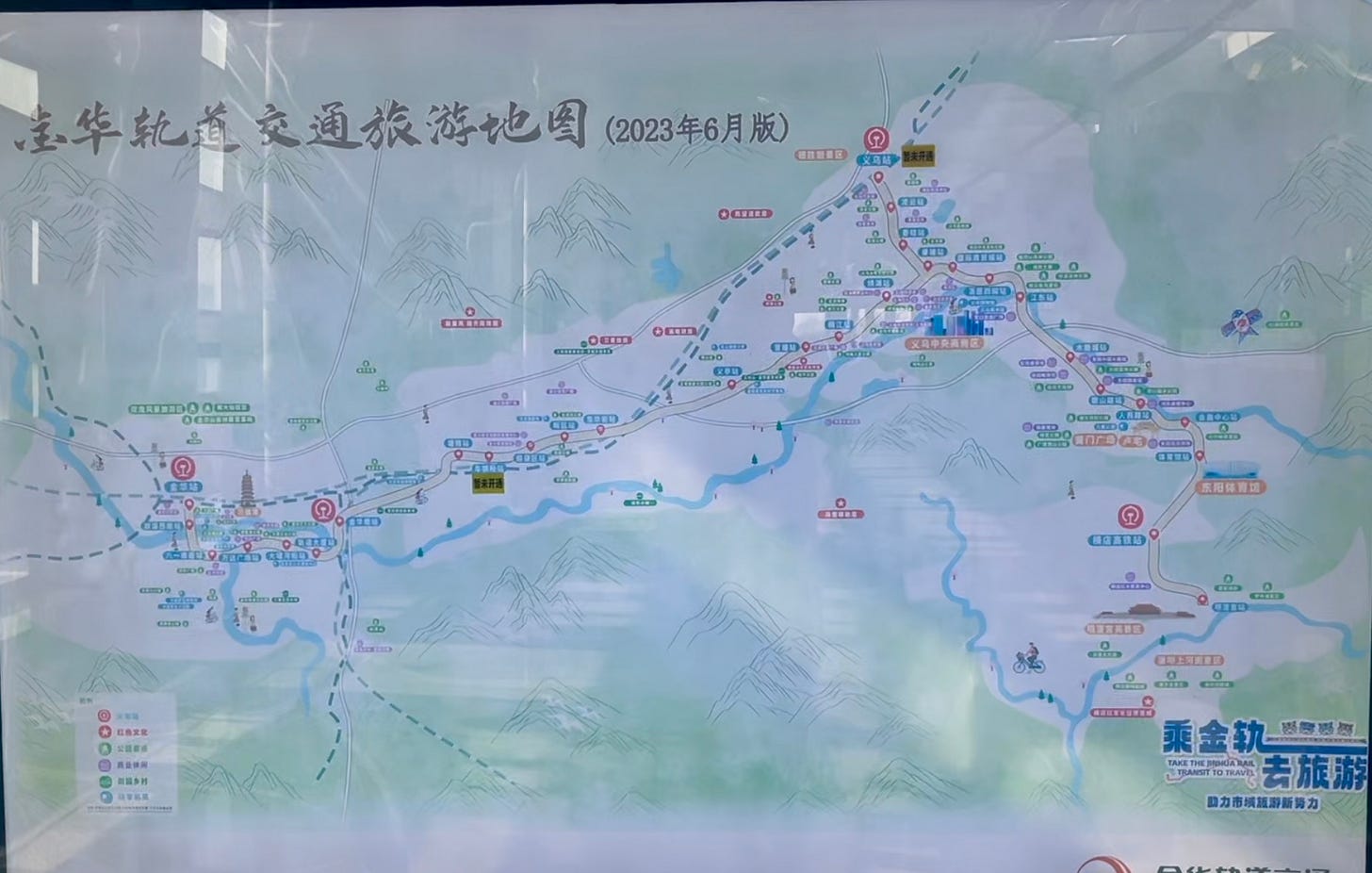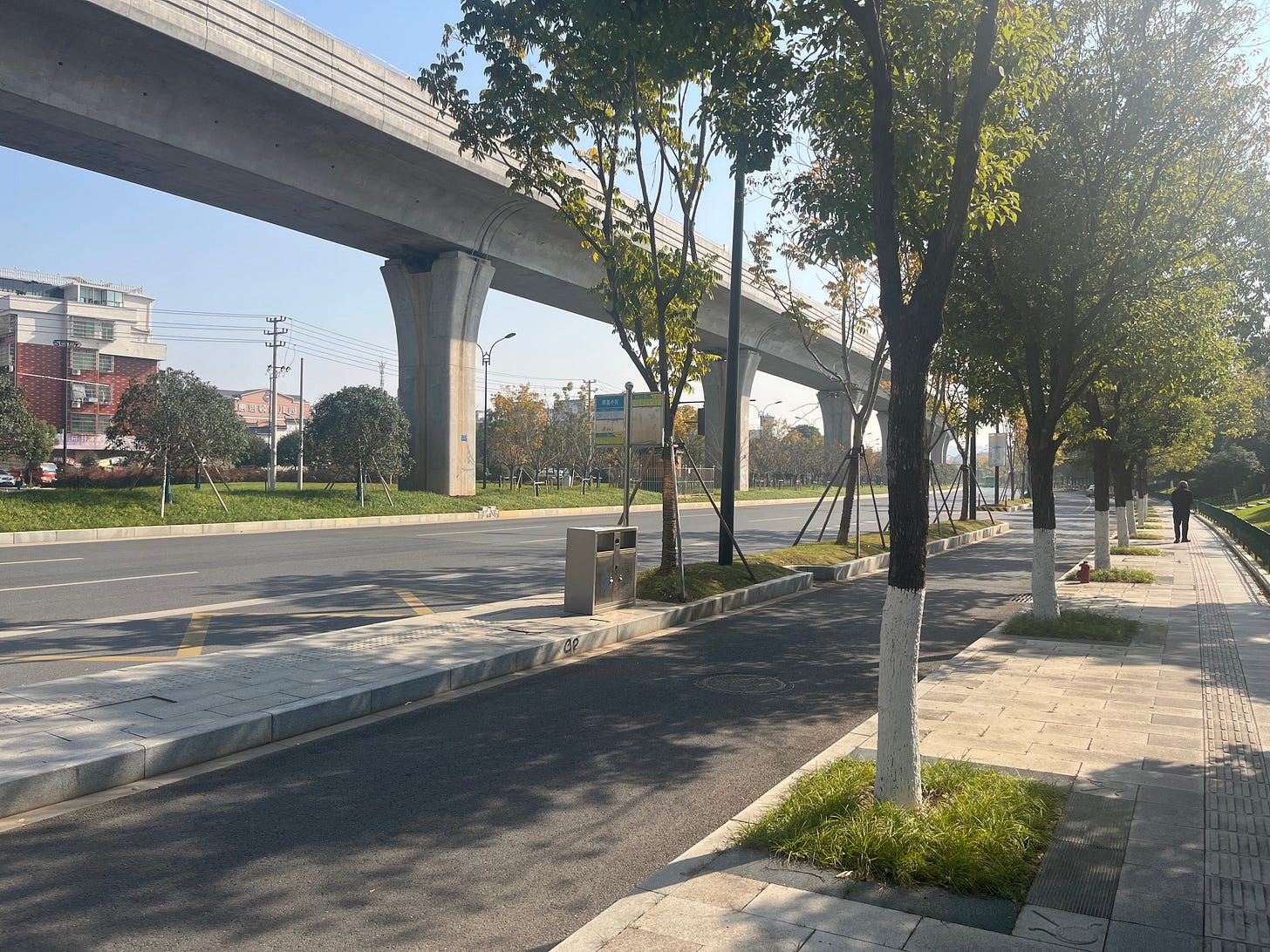Jinyidong (金义东) Trip Part 1: Getting There
From arrival to departing for the first item on the itinerary.
I just got back from a trip to Yiwu (义乌), Jinhua (金华), and Dongyang (东阳). I mostly found these on Google Earth, which I spend way too much time on. As part of my China trip, I wanted to go to a non-1st or 2nd tier city, since everyone goes to the big cities. I wanted to go somewhere that isn’t really on a typical itinerary to see a more “authentic” China. This triplet of cities are close to Shanghai, so it was convenient. This trip ended up being everything I was looking for.
I arrived on a Friday morning at 10 a.m. from Hangzhou. I had three items on my itinerary: Dongyang Woodcarving Museum (东阳木雕艺术博物馆), Yiwu International Market (义务国际商贸城), and Two-Dragon Cave [my translation] (双龙洞). The plan was to do the first two on the first day and the cave on the second after which I’d take the train home. My hotel was in Yiwu at 维也纳国际酒店, Vienna International Hotel, which to be clear is a Chinese hotel chain that tries to take advantage of the false notion that European things are somehow luxurious. Their hotel has some pretty tacky, low-effort, low-quality European theming.
These three cities are connected by the Jinyidong (金义东) metro line. The name is just a combination of the first characters of the three cities. It’s a single line with a branch where my hotel was. Because it’s relatively new, the metro station at Yiwu Railway Station isn’t built yet. That was okay, this was simply an opportunity for me to take the bus.

I’m not going to get into how annoying Alipay is, because it’s partially my fault that I had my American phone number in there causing problems. While I was figuring that out on FaceTime with my dad, the 806 bus I was supposed to take left. After I got my Alipay to work, the next 806 didn’t come for some 25 odd minutes. I decided to go to the 804 bus door, from which I saw that the 806 bus was just hiding behind the corner sitting there. When the 806 bus started moving, I ran back to the 806 door only to see the bus pulling off either because it didn’t wait since nobody else was there or simply didn’t stop at all. I decided to go back to the 804 door, which was now loading, but I was really frustrated. It was 11 a.m., I was hungry, my feet and legs that were hurting so bad from walking a lot the previous days were made worse by the standing and waiting, and now I was extremely worried about my ability to visit both the woodcarving museum and the market, one which closed around 16:30 and the other around 17:30. I even texted my dad to ask that we move the train home to Shanghai to a later time so that I could do everything, but my dad said that I could just do that at night.
The bus was very clean. The buses in China are all pretty sleek and new-looking. They’re also small, whereas in America you’ll see enormous articulated buses. The smaller buses probably make for more flexible and efficient traffic patterns, which is more necessary in China with the aggressive urban driving and all the small mopeds and bikes everywhere. The gap the bus driver left between him and the car in front of him would be so small, I thought we were about to bump the car in front of us every time.

I use Gaode (高德), China’s navigation app, to get around. I think it didn’t have all the bus stops, because it made a stop that was not on the app right before my actual stop, so I got off by accident. I was already running late, and having to do the extra bit by foot on my pained legs and feet was really not ideal. The main road was very nice and clean, but as I got off of that, it got much more dirty and messy.
Between the main road and the smaller roads, I got to walk through a very pretty park with a lake. A little girl was walking with her grandpa on the path, which was fenced on both sides. When she had to pee, her grandpa just held her in the air near the edge of path as she peed. Lowkey not very 文明, but it’s whatever (this is a joke about the fact that China has signs everywhere encouraging people to be 文明, or civilized). I continued on my way.
My plan was to just leave my backpack behind the front desk, and go. Of course, you have to prove that you are staying at the hotel, but they couldn’t find my reservation. My dad had booked for me, so I had to get screenshots from him. When I finally got the information through, they said they originally weren’t able to find my reservation because it was under my name in English. I was pretty annoyed because I said (albeit very timidly) that the reservation name might not be in Chinese, and I’d handed them my passports, which are all American passports. I was feeling very pressured by time. They always ask to see your visa as well, which I think is interesting. I don’t know why they have to have it, and this branch, unlike the Hangzhou branch, asked me my reason for being in Yiwu to enter it into the system.
My dad had told me you can only check in at 8 p.m., but it turns out you can check in as early in the day as you want so long as there’s an open room. That’s a really interesting way to do business. However, when I was dealing with all this, a guy came up to the desk to change rooms, which he claimed he didn’t alter yet. I guess that’s the flip-side, where maybe you might end up getting a room you don’t feel like is worth what you thought you were paying for, so you get to change. As a sidenote, Chinese people practically assault the hotel front desk. I would literally be in active conversation with the clerk and somebody would push right up and start yelling a request.
I went up to my room, which was markedly nicer than the Hangzhou branch. I suspect it’s because the hotel was more recently built. That’s part of the irony of the situation, where the non-1st or 2nd tier city has nicer things because it was built later as development is only just getting out there. Even so, the room still smelled like smoke, the hotel still used central heating, meaning that I couldn’t lower the temperature in my room as only hot air comes out of the vents, and the finer parts of the construction were not done well. For example, the caulking and the misalignments between the floor, trim, and walls. Walking around China generally and seeing how they do construction, I’m not surprised at all, but it doesn’t affect the functionality of the room, so it doesn’t matter that much. My view was very epic, but I couldn’t stay to enjoy it. I closed the curtains to prevent the sunlight from heating my room and left to pursue my itinerary
I had effectively recorded the entire train trip to Yiwu because it was all very interesting to me, so my phone needed charging. They have a 充电宝 machine, which is just a box with battery packs that you can pay about 2.5 yuan to use. This is a pretty ubiquitous service in China that would be nice to have in America, although I sincerely don’t think Americans have their phones on as much as Chinese people do. I couldn’t get my Alipay to pay for it (of course), so I had to ask the hotel worker to pay for it (for which I transferred her money on WeChat). She said something about the fact that I need to accumulate enough usage points in order to access the service. Who knows if that’s true, but whatever it is, it’s frustrating and I still have yet to figure it out.
I went right next door to a restaurant to eat. I might have looked more extensively if I wasn’t in a rush. The restaurant was empty except for these four dudes who kept singing to the songs being played over the sound system. They clearly knew the one person working there, who was just another young guy wearing regular street clothes. The dishware and cutlery were in new paper packaging, that I had to tear open. I don’t get it at all: there’s no way each person who eats is provided brand new ceramic dishware, but that’s what it seemed like. I had to ask the guy whether I was supposed to tear it open or not because I was so confused (I have since been informed that they dishware is delivered by a cleaning service, it’s not entirely new). I ordered snail soup and some meatball thing.
The meatball thing was great, the snail soup not so much. It was a milky soup with ginger, garlic cloves, green onions, seemingly really old bits of salty ham, and a bunch of snails. I honestly don’t know why I ordered it at all. I had no clue how to eat the snails, so I asked the guy and he kind of incredulously said, “just suck it out!” like it was really self-evident or something. Well, I could barely suck them out. I tried maybe 10 and had a 50% success rate, of which some were actually pulled out with my fingernails with significant effort. The texture was kind of odd, and some of it felt like there were rocks and bits in there that did not make me feel good about what I was ingesting. By now, the time was nearly 1 p.m. I left the remaining 20 snails, hurried back to my hotel room to brush my teeth, wash my hands, and headed out to the Dongyang Woodcarving Museum.
Read the next installment here:












螺丝is what people in this area grow up with. So it must be funny to them that you don’t know how to eat it.